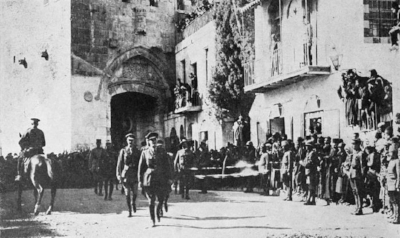I am one of the Exiles of Newark, New Jersey.
My father was raised on Goldsmith Avenue, became a Bar Mitzvah at Young Israel, and went to Weequahic High School, class of ’59. His mother was born in Newark; both she and my grandfather spent their careers teaching in the Newark public school system. My great-grandparents’ graves are in Newark, in the McClellan Street cemeteries.
No doubt I would have been there too. Except that, to bastardize the words of Agnon, through a historical accident—the upward mobility of postwar Jews, the riots of 1967—I was born in one of the villages of the Diaspora.
The Old B'nai Jeshurun building in Newark, now Hopewell Baptist Church.
It always struck me that Newark must have been one of the most extraordinary communities of the American Exile. All the currents of Jewish life in early 20th century America—socialism, Zionism, Reform, Orthodoxy, Yiddish culture, labor—flourished in its environs. In 1948, nearly 60,000 Jews lived in Newark[1], served by scores of synagogues. The caliber of rabbis, cultural figures, political leaders, labor and social justice advocates, business leaders, and philanthropists that emerged from that place is astounding. And it disappeared so incredibly quickly.
But Newark endured in the stories of Philip Roth, and for that reason I always took Roth’s writings personally. As he dissected the psyche of the city and its expatriates, I told myself I was discovering my origins. (That’s ridiculously romantic, of course. Like many Jews of Eastern European descent, my family lived in Newark for barely two and a half generations. But we’ve got very little to go on about the Old Country—the shtetlach and hamlets that were annihilated by the Russians, Poles, Ukrainians, et al—so Newark is all I’ve got.)
Roth left Newark, but wouldn’t leave it behind. Newark—with its concentration of Jews anxious to become optometrists and entertainment lawyers and accountants; its polio terror and stickball in the streets; its racial tensions and Nazi paranoia—was a prism through which he wrote about America.
Now that Roth is dead, the American Jewish community can start doing what it always does: remaking him in our image. Which is rather a shame.
Because Roth at his core was the wicked child of the Seder. He dared to fling our pieties in our faces and say, “Yes—but what does all this mean to you?” Starting with Goodbye, Columbus and running like a crimson thread throughout his work, he satirized and criticized the Jewish community as only an insider could.
Consider his devastating short story, “The Conversion of the Jews” (1959). Ozzie Freedman is a bored Hebrew school kid of the sort that the Coen Brothers captured so perfectly in the movie A Serious Man. He is punished by the rabbi and other authorities for asking “dangerous” questions, the kind that the wicked child asks. Ultimately Ozzie ends up on the roof, threatening to jump unless the Rabbi and the adults answer the question that got him rebuked in the first place: “Do you think that an almighty God could make a child without intercourse?”
It’s so perfect, because Ozzie found the exact question to prick everyone’s sensibilities: the rabbi’s platitudes, the newly-emancipated liberal Jews’ boundaries with their Christian neighbors, and of course the sexual obsessions which Roth would explode in Portnoy’s Complaint.
Or consider his 1993 novel Operation Shylock. The narrative itself is outrageous. A famous Jewish writer named Philip Roth discovers that some nutjob has taken the alter ego “Philip Roth” and is spreading the gospel of “Diasporism,” leading Jews out of Israel and back to Europe—an antisemitic fantasy!
But here’s the rub: like any great critic, Roth knew intimately the subject he criticized, which ultimately rebounded back on himself. If he mocked Israel as a modern Jewish shibboleth, Operation Shylock also shows a deep intimacy with its people, its culture, and its totems. For instance, his true (not fictional) dialogues with Israeli author Aharon Appelfeld in the book (Appelfeld died just this past January) reveal sensitive insights about what, exactly, Jewish identity means at the turn of the twenty-first century.
Ultimately Roth’s subject wasn’t Judaism, it was America. He asked: Why shouldn’t the Jewish lens be as valid as any other lens through which we can understand America? After all, Faulkner wrote about America, but through the perspective of the American South. So did Steinbeck, via the western frontier. So did Ellison, and Kerouac, and so on. America is big and complex and refracted into a thousand hues. Who’s to say that America’s freedoms and dysfunctions aren’t perfectly represented through the eyes of Bucky Cantor, a Newark playground director terrorized by polio (Nemesis, 2010)? Or Coleman Silk, the classics professor who gets caught in the wheels of the political correctness machine (The Human Stain, 2000)?
Or, for that matter, Roth’s masterful creation Swede Levov, the protagonist of American Pastoral (1997)? His name is the perfect encapsulation of Roth’s work: a Newark Jew who marries a (shiksa) beauty queen, flees to the Jersey suburbs, and expects that his Nordic looks and nickname will help him shed his history. But the shtetl, and the past, is as present as his surname.
America does fascinating things to the identities of its immigrants and their descendants. Those complexities are more than enough to stake a career on. We were blessed to be of a generation that had such an articulate master to challenge our assumptions and satirize our self-righteousness. If we grapple with Roth seriously, we will understand ourselves better—because it will be much harder to hide.
[1] William B. Helmreich, The Enduring Community: The Jews of Newark and Metrowest, New Brunswick, NJ: Transaction Publishers, 1999, p.30.


